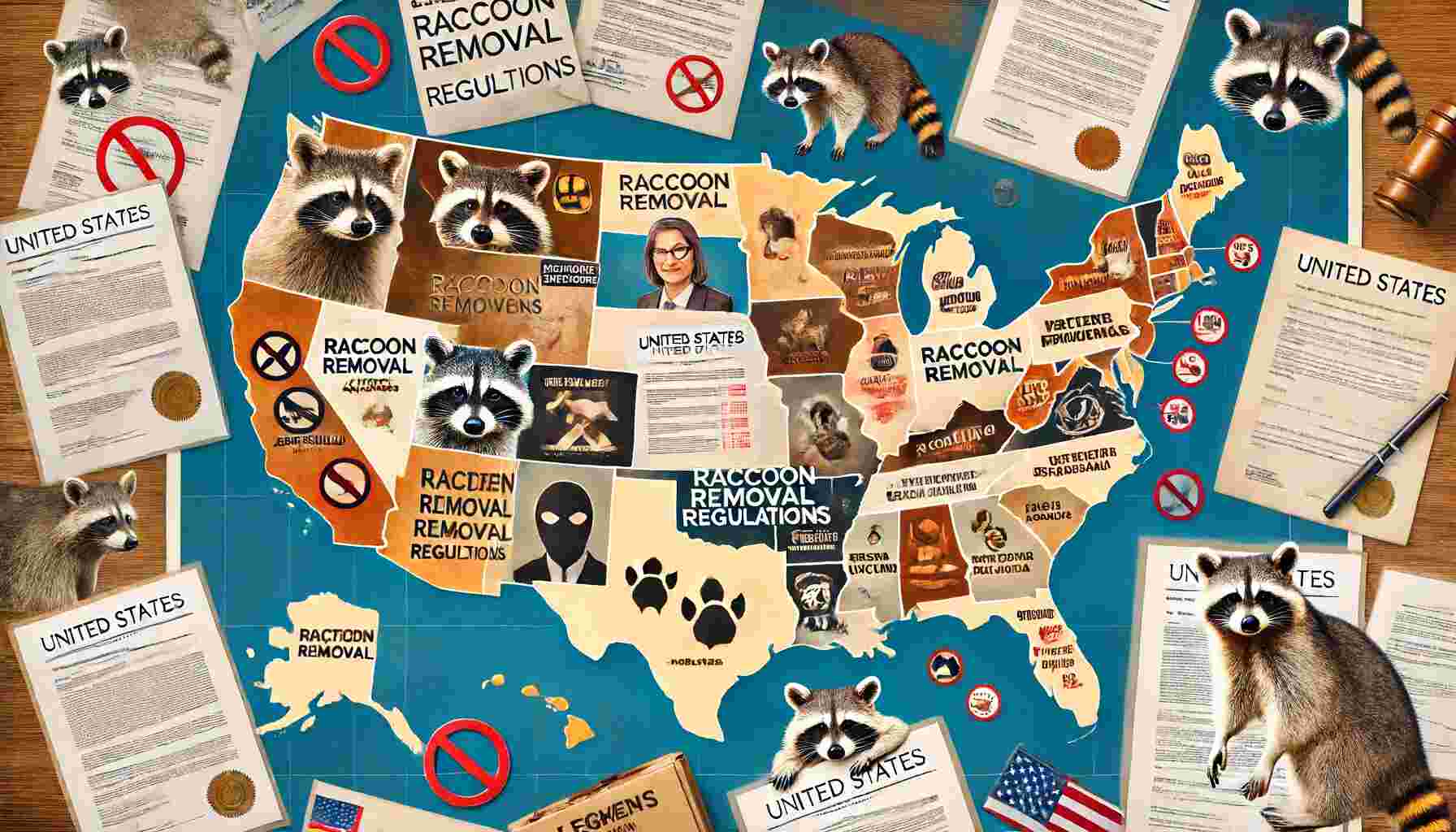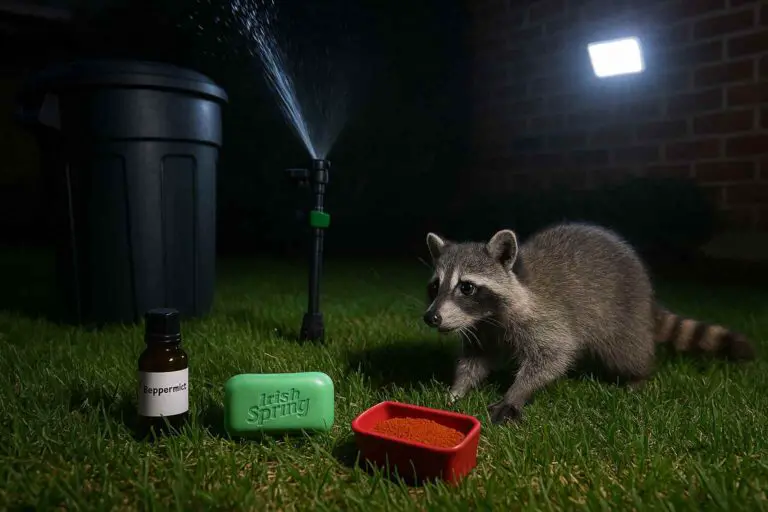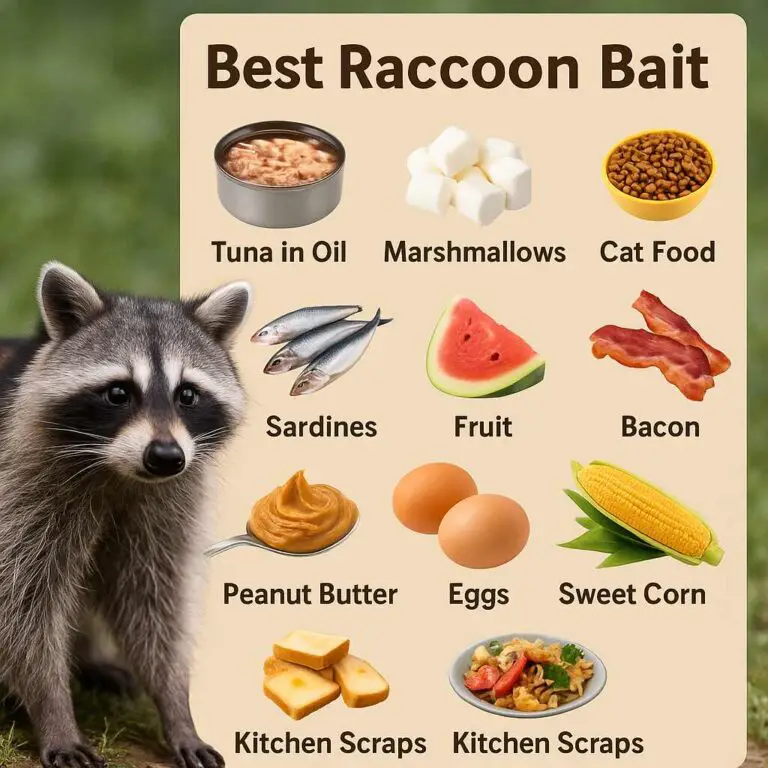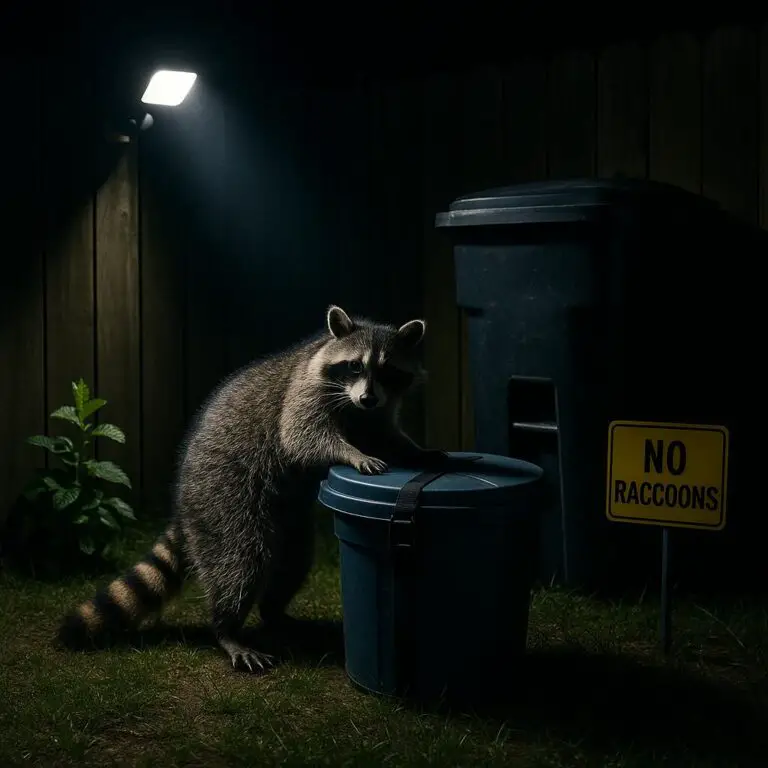Understanding the laws and regulations surrounding raccoon removal is crucial for homeowners and wildlife control professionals. This comprehensive guide provides detailed information on state-specific regulations, permits, legal considerations, and contact information for local wildlife authorities.
Understanding Raccoon Behavior and Risks
Raccoons are nocturnal mammals known for their intelligence and dexterity. They can open doors, unlatch cages, and even manipulate objects to find food or shelter. While they play an essential role in the ecosystem as scavengers, raccoons can become a nuisance when they invade human habitats, causing property damage and posing health risks. Raccoons can carry diseases such as rabies and raccoon roundworm, which can be transmitted to humans and pets.
General Considerations for Raccoon Removal
Before diving into state-specific regulations, it’s important to understand some general principles of raccoon removal:
- Humane Methods: Always use humane methods for capturing and relocating raccoons. Inhumane treatment can lead to legal repercussions and unnecessary suffering for the animals.
- Prevention: Seal entry points to your home and secure trash cans to prevent raccoons from becoming repeat visitors.
- Safety: Wear protective gear when handling raccoons to prevent bites and scratches.
State-Specific Regulations
Note: The following information provides a general overview of raccoon removal regulations by state. Always verify with local wildlife authorities for the most current and accurate information.
Alabama
Regulations: In Alabama, it is legal to trap and remove raccoons without a permit if they are causing damage to property. Permits: No permit is required for homeowners to trap raccoons. Contact Information: Alabama Department of Conservation and Natural Resources – (334) 242-3465
Alaska
Regulations: Alaska considers raccoons non-native and permits their removal. Permits: A permit is required for relocating raccoons. Contact Information: Alaska Department of Fish and Game – (907) 465-4100
Arizona
Regulations: Raccoons can be trapped and removed, but relocation requires permission. Permits: Permit required for relocation. Contact Information: Arizona Game and Fish Department – (602) 942-3000
Arkansas
Regulations: Raccoons causing property damage can be removed without a permit. Permits: No permit required for homeowners. Contact Information: Arkansas Game and Fish Commission – (800) 364-4263
California
Regulations: In California, raccoons are considered non-game mammals, and it is legal to trap them. However, relocation is not allowed; they must be released on-site or euthanized humanely. Permits: No permit required for trapping. Contact Information: California Department of Fish and Wildlife – (916) 445-0411
Colorado
Regulations: Homeowners may trap raccoons but must euthanize them or release them on the same property. Permits: No permit required for trapping, but special rules apply for relocation. Contact Information: Colorado Parks and Wildlife – (303) 297-1192
Connecticut
Regulations: Raccoons can be trapped, but relocation requires a permit. Permits: Permit required for relocation. Contact Information: Connecticut Department of Energy and Environmental Protection – (860) 424-3000
Delaware
Regulations: Homeowners may trap raccoons if they are damaging property. Permits: No permit required for trapping on personal property. Contact Information: Delaware Division of Fish and Wildlife – (302) 739-9912
Florida
Regulations: Florida allows for the trapping of raccoons, but they must be euthanized or released on the same property. Permits: No permit required for homeowners. Contact Information: Florida Fish and Wildlife Conservation Commission – (850) 488-4676
Georgia
Regulations: It is legal to trap and relocate raccoons, but relocation requires landowner permission. Permits: No permit required for trapping. Contact Information: Georgia Department of Natural Resources – (706) 557-3333
Hawaii
Regulations: Raccoons are not native to Hawaii and are rare. Any sightings should be reported immediately. Permits: Special permission required for any handling. Contact Information: Hawaii Department of Land and Natural Resources – (808) 587-0400
Idaho
Regulations: Raccoons can be trapped and removed if they are causing damage. Permits: No permit required for homeowners. Contact Information: Idaho Department of Fish and Game – (208) 334-3700
Illinois
Regulations: Trapping raccoons is allowed, but they must be euthanized or released on-site. Permits: No permit required for homeowners. Contact Information: Illinois Department of Natural Resources – (217) 782-6302
Indiana
Regulations: Homeowners may trap raccoons, but they must euthanize or release them on the same property. Permits: No permit required for homeowners. Contact Information: Indiana Department of Natural Resources – (317) 232-4200
Iowa
Regulations: It is legal to trap raccoons, but they must be euthanized or released on-site. Permits: No permit required for homeowners. Contact Information: Iowa Department of Natural Resources – (515) 725-8200
Kansas
Regulations: Raccoons can be trapped and removed if causing property damage. Permits: No permit required for homeowners. Contact Information: Kansas Department of Wildlife, Parks, and Tourism – (620) 672-5911
Kentucky
Regulations: Homeowners may trap raccoons, but relocation requires a permit. Permits: Permit required for relocation. Contact Information: Kentucky Department of Fish and Wildlife Resources – (800) 858-1549
Louisiana
Regulations: Trapping is allowed, but relocation requires permission. Permits: Permit required for relocation. Contact Information: Louisiana Department of Wildlife and Fisheries – (225) 765-2800
Maine
Regulations: Raccoons can be trapped if causing damage. Permits: No permit required for trapping. Contact Information: Maine Department of Inland Fisheries and Wildlife – (207) 287-8000
Maryland
Regulations: Homeowners can trap raccoons, but relocation requires a permit. Permits: Permit required for relocation. Contact Information: Maryland Department of Natural Resources – (877) 620-8367
Massachusetts
Regulations: Raccoons can be trapped if they are causing property damage. Permits: No permit required for homeowners. Contact Information: Massachusetts Division of Fisheries and Wildlife – (508) 389-6300
Michigan
Regulations: Homeowners may trap raccoons, but they must be released on-site or euthanized. Permits: No permit required for homeowners. Contact Information: Michigan Department of Natural Resources – (517) 284-9453
Minnesota
Regulations: Trapping and removal are allowed, but relocation requires permission. Permits: Permit required for relocation. Contact Information: Minnesota Department of Natural Resources – (888) 646-6367
Mississippi
Regulations: Homeowners can trap raccoons without a permit if causing damage. Permits: No permit required for homeowners. Contact Information: Mississippi Department of Wildlife, Fisheries, and Parks – (601) 432-2400
Missouri
Regulations: Raccoons can be trapped if causing property damage. Permits: No permit required for homeowners. Contact Information: Missouri Department of Conservation – (573) 751-4115
Montana
Regulations: Homeowners may trap raccoons without a permit if they are causing damage. Permits: No permit required for homeowners. Contact Information: Montana Fish, Wildlife & Parks – (406) 444-2535
Nebraska
Regulations: It is legal to trap raccoons, but they must be euthanized or released on-site. Permits: No permit required for homeowners. Contact Information: Nebraska Game and Parks Commission – (402) 471-0641
Nevada
Regulations: Raccoons can be trapped if causing property damage, but relocation requires a permit. Permits: Permit required for relocation. Contact Information: Nevada Department of Wildlife – (775) 688-1500
New Hampshire
Regulations: Homeowners can trap raccoons, but relocation requires a permit. Permits: Permit required for relocation. Contact Information: New Hampshire Fish and Game Department – (603) 271-3421
New Jersey
Regulations: It is legal to trap raccoons, but they must be euthanized or released on-site. Permits: No permit required for homeowners. Contact Information: New Jersey Division of Fish and Wildlife – (609) 292-2965
New Mexico
Regulations: Homeowners may trap raccoons if they are causing damage. Permits: No permit required for homeowners. Contact Information: New Mexico Department of Game and Fish – (505) 476-8000
New York
Regulations: Raccoons can be trapped, but relocation requires a permit. Permits: Permit required for relocation. Contact Information: New York State Department of Environmental Conservation – (518) 402-8924
North Carolina
Regulations: Homeowners can trap raccoons, but relocation requires a permit. Permits: Permit required for relocation. Contact Information: North Carolina Wildlife Resources Commission – (919) 707-0010
North Dakota
Regulations: Raccoons can be trapped if causing property damage. Permits: No permit required for homeowners. Contact Information: North Dakota Game and Fish Department – (701) 328-6300
Ohio
Regulations: It is legal to trap raccoons, but they must be euthanized or released on-site. Permits: No permit required for homeowners. Contact Information: Ohio Department of Natural Resources – (614) 265-6565
Oklahoma
Regulations: Homeowners may trap raccoons if they are causing damage. Permits: No permit required for homeowners. Contact Information: Oklahoma Department of Wildlife Conservation – (405) 521-3851
Oregon
Regulations: Raccoons can be trapped if causing property damage, but relocation requires a permit. Permits: Permit required for relocation. Contact Information: Oregon Department of Fish and Wildlife – (503) 947-6000
Pennsylvania
Regulations: Homeowners can trap raccoons, but relocation requires a permit. Permits: Permit required for relocation. Contact Information: Pennsylvania Game Commission – (717) 787-4250
Rhode Island
Regulations: It is legal to trap raccoons, but they must be euthanized or released on-site. Permits: No permit required for homeowners. Contact Information: Rhode Island Department of Environmental Management – (401) 222-2781
South Carolina
Regulations: Homeowners may trap raccoons if they are causing damage. Permits: No permit required for homeowners. Contact Information: South Carolina Department of Natural Resources – (803) 734-3886
South Dakota
Regulations: Raccoons can be trapped if causing property damage. Permits: No permit required for homeowners. Contact Information: South Dakota Game, Fish, and Parks – (605) 223-7660
Tennessee
Regulations: Homeowners may trap raccoons, but relocation requires a permit. Permits: Permit required for relocation. Contact Information: Tennessee Wildlife Resources Agency – (615) 781-6500
Texas
Regulations: It is legal to trap raccoons, but they must be euthanized or released on-site. Permits: No permit required for homeowners. Contact Information: Texas Parks and Wildlife Department – (512) 389-4800
Utah
Regulations: Homeowners may trap raccoons if they are causing damage. Permits: No permit required for homeowners. Contact Information: Utah Division of Wildlife Resources – (801) 538-4700
Vermont
Regulations: Raccoons can be trapped, but relocation requires a permit. Permits: Permit required for relocation. Contact Information: Vermont Fish & Wildlife Department – (802) 828-1000
Virginia
Regulations: Homeowners may trap raccoons if they are causing damage. Permits: No permit required for homeowners. Contact Information: Virginia Department of Wildlife Resources – (804) 367-1000
Washington
Regulations: It is legal to trap raccoons, but relocation requires a permit. Permits: Permit required for relocation. Contact Information: Washington Department of Fish and Wildlife – (360) 902-2200
West Virginia
Regulations: Homeowners may trap raccoons if they are causing damage. Permits: No permit required for homeowners. Contact Information: West Virginia Division of Natural Resources – (304) 558-2758
Wisconsin
Regulations: Raccoons can be trapped if causing property damage. Permits: No permit required for homeowners. Contact Information: Wisconsin Department of Natural Resources – (888) 936-7463
Wyoming
Regulations: Homeowners may trap raccoons if they are causing damage. Permits: No permit required for homeowners. Contact Information: Wyoming Game and Fish Department – (307) 777-4600
Legal Considerations and Permits
In many states, homeowners can trap raccoons without a permit if they are causing property damage. However, the legality of relocating raccoons varies significantly by state, often requiring special permits. It’s crucial to check local regulations before attempting to trap or relocate raccoons.
Humane Trapping and Euthanasia
The Humane Society recommends using live traps and relocating raccoons within a short distance to avoid family separation and reduce stress. However, some states mandate euthanasia if relocation is not an option. Always adhere to state regulations to avoid legal issues and ensure humane treatment.
Contact Information for Wildlife Authorities
It’s essential to contact local wildlife authorities for guidance and to ensure compliance with state laws. They can provide specific information about regulations, permits, and humane trapping methods. Use the contact information provided in the state-specific sections above to reach out to your local authorities.
Conclusion
Understanding raccoon removal laws by state is essential for responsible and legal wildlife control. This guide provides a comprehensive overview of state-specific regulations, permits, and contact information for local authorities. Always prioritize humane methods and consult with local wildlife authorities to ensure compliance with state laws and the well-being of the animals.
Helpful Links and Resources
- Humane Society: Raccoon Removal Guidelines
- National Wildlife Control Operators Association
- Amazon Wildlife Control Products
Amazon Affiliate Links








